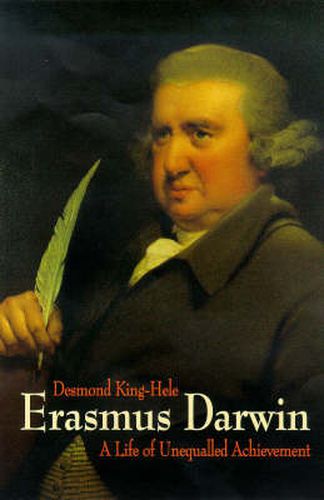Erasmus Darwin: a Life of Unequalled Achievement
Desmond King-Hele

Erasmus Darwin: a Life of Unequalled Achievement
Desmond King-Hele
It has been said of Erasmus Darwin (1731-1802) that no one from his day to ours has ever rivalled him in his achievements in such a wide range of fields. He was a far-sighted scientific genius, fertile in theory and invention, and one of the foremost physicians of his time. His gift for friendship enabled him to recruit the members of the Lunar Society of Birmingham which is often seen as the main intellectual powerhouse of the Industrial Revolution in England. He was especially close to Franklin, Wedgwood, Boulton and Watt. Towards the end of his life he gained recognition as the leading English poet in the country, and he deeply influenced Blake, Wordsworth, Coleridge and Shelley. The most striking of Darwin’s many talents was his extraordinary scientific insight in physics, chemistry, geology, meteorology and all aspects of biology – his deepest insight being his evolutionary theory of life. Two of his books, the Zoonomia, which made him famous as the leading medical mind of the 1790s, and The Temple of Nature, a long poem, show that he believed life developed from microscopic specks in primeval seas through fishes and amphibians to ‘humankind’. But he failed to convince the world about biological evolution: that was left to his grandson Charles. Erasmus was the first person to give a full description of how clouds form and of photosynthesis in plants. He was also an obsessive inventor of mechanical devices, among them a speaking machine, a copying machine and the steering technique used in modern cars. Substantial donations of Darwin family papers recently to the Cambridge University Library, including over 170 letters written by Erasmus Darwin himself, have made it possible for the author to tell much of the enthralling story of his life in Erasmus’ own words. Desmond King-Hele, who is the leading authority on Erasmus Darwin having studied his life and work for three decades, is a mathematician and physicist who is an expert on space research by satellite, in particular on the Earth’s gravity field and the upper atmosphere. A Fellow of the Royal Society since 1966, he has written fifteen books including a standard critical work on Shelley, Shelley: His Thought and Work, and Erasmus Darwin and the Romantic Poets; and he has edited the Letters of Erasmus Darwin.
This item is not currently in-stock. It can be ordered online and is expected to ship in approx 4 weeks
Our stock data is updated periodically, and availability may change throughout the day for in-demand items. Please call the relevant shop for the most current stock information. Prices are subject to change without notice.
Sign in or become a Readings Member to add this title to a wishlist.


